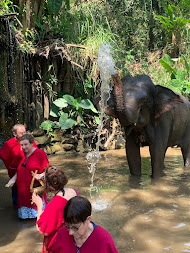Ever since we saw the
Oscar winning documentary “Elephant Whisperers” about an Indian couple who
cared for an orphaned baby elephant we were enamored with the possibility of
getting up close to them ourselves.
Our subsequent day of meeting
them at the Elephant Eco Valley Zoo was perhaps our most fascinating day in our
travels to Thailand.
Once we arrived at the zoo we were asked to put on maroon smocks and water shoes that they provided, placing the items we wanted to keep dry in lockers. The smocks made us look like we were in a cult of some sort, but they kept us dry when we went to bathe the elephants.
Our guide at the zoo
spoke perfect English and told us about the care of these intelligent animals
and how they could be extremely skittish. i.e. They are very frightened by bees
and could get nervous with loud noises.
There was a large field
sectioned off by wooden fencing and at the far end similarly dressed cult
members (joke) were feeding elephants, something we would be doing soon
ourselves.
He walked us around to
meet an elephant and her mahout. Her name was Tata. She was 40 years old. Asian
elephants are smaller than African elephants and my height reached Tata’s eyes.
With the help of her mahout who will be with Tata for the rest of her life, she
showed us her feet, her trunk and we each got to pose for pictures with the
seemingly docile elephant.
UNETHICAL?
 |
| Tata and her mahout |
Well, Tata posed with
everyone and endured all the petting we gave her and used her trunk as an
elevator to lift her mahout so he could show how one would ride her. She then fetched
the flip flop he dropped and “handed” it to him with her very tactile trunk.
Riding elephants
happens at many places in Thailand. It you do a quick online search you will
find seemingly countless other such “elephant care centers”.
They don’t ride elephants at Eco Valley, and neither should you, but other places allow. PETA feels that elephants should only be observed and not interacted with, as we did on our visit.
While conversing with
Tata a much larger bull elephant with tusks that nearly reached the ground
thudded past us into the field. Several other elephants followed. It was a new
group coming in for their feeding, and these elephants do eat a lot.
SO, YOU WANT TO BE A MAHOUT?
 |
| What's brown and sounds like a bell? Dung |
In the wild elephants
will not eat in unclean areas and need to roam for food; sometimes they stray
onto farms. This obviously is a pain for the farmers, and they dissuade roaming
herds with loud noises and even electrical fencing. It’s a delicate balance as
the elephant is considered the royal symbol of Thailand and hurting an elephant
is probably not a good thing.
Domesticated elephants
like those at Elephant Eco Valley don’t have to roam vast areas of forest to avoid
eating where they poop. That’s because part of the mahout’s job is to collect
the dung.
(Insert joke here.)
This keeps the captive
elephant’s areas clean, and the fibrous dung is used to make large sheets of
paper. The mahouts process this poo and wash out all the bacteria and the fibers
are dried out onto large screens in frames. The resulting paper is then fashioned
into notecards, etc. The paper doesn’t smell.
Everyone in our group
politely declined when given the chance to help in the process.
As a gift for our visit
to Eco Valley we were given picture frames made from poo paper. Now we tell
friends who visit how shit-faced we are in the picture, with Tata looking on
approvingly.
 |
| Making Elephant vitamin pills |
Later, at the field we got to feed them. Five or so came right up to the fencing and begged for the “vitamin” pills and sugar cane and bananas that we obligingly fed them. Elephants are strong and intelligent. They understand words and if we said, “Ba” instead of reaching for the food with their trunks, they would lift them and open their mouths so we could feed them directly. None were aggressive, but you could see them watching us as we reached for more food and they wouldn’t leave until our cache of edibles was gone.
It was truly a great
experience.
Well, part of the visit
to Eco Valley was to bathe elephants. Armed with buckets and pulverized sugar
cane stalks that served as brushes (and were later eaten by the elephants) some
of our group waded into the water and tended to the appreciative beasts. One
even lay on it side, sprouting water in the air like a fountain. (We were
cautioned to stay to the back side of the elephant, not by the feet. Earlier
this year at another care center a woman who on the belly side of the elephant was
killed when the elephant abruptly moved.)
We were told the elephants loved the bathing and it was wonderful to caress their bristly rough skin as we scrubbed and tossed buckets of water on them. At the end they gobbled up the brushes.
Janet and I were the
last ones out and the elephant who had been lying in the water stood up and
started spraying us with water. Of course, his mahout was telling him to do so,
and you can see the handler motion for the elephant to give us a good soaking
in the attached video. The beast shrugged off my counter- attack.
We may have been “purified”
in a Songkran festival at Eco Valley, but the shower was very necessary. Don’t want
to have that elephant water on your body for too long!
Afterwards we were
served a very large lunch and given the poo paper picture frames as parting
gifts.
THE DARK SIDE
These intelligent and strong creatures are important to Thailand as the royal symbol of the country. In many Asian cultures the elephant is considered sacred. Buddhist texts describe one of the Buddha’s past lives as an elephant.
They have been used in
war, transportation and before logging was banned in 1989 used for manual
labor, dragging logs through the forest. This was the elephant’s primary “occupation”
but afterwards mahouts, whose skills as handlers have been passed down through
generations, and their elephants turned to the entertainment industry and
tourism to earn a living.
During the pandemic tourism
collapsed in Thailand and caused severe hardship for elephants and mahouts, making
it difficult to properly care for the animals. Now, with tourism returning, questions
are growing about the ethical treatment of the elephants. Elephants are a matriarchal
society and form strong social bonds within their herd that transit generations.
Even grandmother elephants help with the care of their granddaughters.
After our visit to Elephant
EcoValley, I read up on the industry. All the “activities” we did at the zoo,
like feeding and bathing them, is unnatural. Overfeeding leads to obesity,
bathing is a social activity for the elephants, and they cover their skin with
mud to act as a sunscreen and insect repellent. Repeated baths throughout the
day can lead to skin afflictions.
The best eco-tourist
activity is to watch the elephants from afar, like at the Elephant Nature Park,
down the road from Elephant EcoValley, where rescued animals are kept in
spacious areas and tourists are invited to watch the elephants as they go about
their lives. It would be difficult to release formerly captive elephants into
the wild because they haven’t learned to cope in the wild.
Elephant EcoValley is
not on this list.
We had a great time
that day, but I doubt I will ever do it again, Songkran water fight or not.
Read more from Sustainable Travel International?
STICKING YOUR NECK OUT
All we saw of the
village really was the line of ‘shops’ with Karen women selling trinkets, cloth weavings and t-shirts. The
women all wore large bands of metal around their necks giving the appearance it
was elongated. Some of the women were very demure and sat, their eyes downcast,
while others were engaging and offered to pose for pictures and even offered to
place the neck bands around some of our group. Some women were weaving cloth
for sale, others were selling everything from keychains to t-shirts. I felt
awkward about being there, but I knew they relied on our tourism dollars.
Thanks for reading.
The trailer for the Elephant Whisperers on Netflix.
Love Janet and greg
© 2025 by Gregory Dunaj




































No comments:
Post a Comment